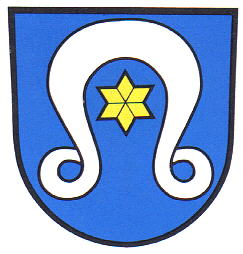Östringen: Difference between revisions
Knorrepoes (talk | contribs) m (Text replacement - "Literature" to "Literature") |
Knorrepoes (talk | contribs) m (Text replacement - "kettle-hook" to "kettle hook") Tags: Mobile edit Mobile web edit |
||
| (19 intermediate revisions by the same user not shown) | |||
| Line 1: | Line 1: | ||
<seo title="Wappen, Gemeindewappen" />'''ÖSTRINGEN''' | |||
'''ÖSTRINGEN''' | |||
State : [[Baden-Württemberg]]<br/> | State : [[Baden-Württemberg]]<br/> | ||
| Line 11: | Line 5: | ||
Additions : 1972 [[Eichelberg (Östringen)|Eichelberg]], [[Tiefenbach (Östringen)|Tiefenbach]], 1974 [[Odenheim]] | Additions : 1972 [[Eichelberg (Östringen)|Eichelberg]], [[Tiefenbach (Östringen)|Tiefenbach]], 1974 [[Odenheim]] | ||
[[File:ostringe.jpg|center|Wappen von {{PAGENAME}}]] | [[File:ostringe.jpg|center|alt=Wappen von {{PAGENAME}}/Arms (crest) of {{PAGENAME}}]] | ||
= | {| class="wikitable" | ||
In Blau ein silberner Kesselring, darin ein goldener Stern. | |+Official blazon | ||
|- | |||
|'''German''' | |||
| In Blau ein silberner Kesselring, darin ein goldener Stern. | |||
|- | |||
|'''English''' | |||
| blazon wanted | |||
|} | |||
===Origin/meaning=== | |||
The arms were granted in 1907. | The arms were granted in 1907. | ||
The arms show as the main symbol a kettle | The arms show as the main symbol a kettle hook, which was probably the old village sign. It first appears on the main bell in the local church, dating from 1709. The symbol is also used in the 18<sup>th</sup> century on border stones. It is sometimes used in the village as the Greek letter omega, and would thus be derived from the first letter of the name of the town. There are no historical data to support this theory. | ||
The oldest use as an official symbol dates from the seals of the village from the early 19<sup>th</sup> century. Even though the village had its own council as far back as the 13<sup>th</sup> century, there are no seals known. The seals show under the hook the star. The meaning or origin of the star is not known. During the last two centuries the star is often imisinterpreted as a flower, even in a 19<sup>th</sup> century seal. | The oldest use as an official symbol dates from the seals of the village from the early 19<sup>th</sup> century. Even though the village had its own council as far back as the 13<sup>th</sup> century, there are no seals known. The seals show under the hook the star. The meaning or origin of the star is not known. During the last two centuries the star is often imisinterpreted as a flower, even in a 19<sup>th</sup> century seal. | ||
| Line 26: | Line 27: | ||
{{de}} | |||
{{media}} | {{media}} | ||
[[Civic Heraldry Literature - Germany|Literature]] : John, H. : Wappenbuch des Landkreises Karlsruhe. Stuttgart, 1986. | [[Civic Heraldry Literature - Germany|'''Literature''']]: John, H. : Wappenbuch des Landkreises Karlsruhe. Stuttgart, 1986. | ||
[[Category:German Municipalities O|Ostringen]] | [[Category:German Municipalities O|Ostringen]] | ||
Latest revision as of 08:22, 2 August 2024
ÖSTRINGEN
State : Baden-Württemberg
District (Kreis) : Karlsruhe (until 1972 Bruchsal)
Additions : 1972 Eichelberg, Tiefenbach, 1974 Odenheim
| German | In Blau ein silberner Kesselring, darin ein goldener Stern. |
| English | blazon wanted |
Origin/meaning
The arms were granted in 1907.
The arms show as the main symbol a kettle hook, which was probably the old village sign. It first appears on the main bell in the local church, dating from 1709. The symbol is also used in the 18th century on border stones. It is sometimes used in the village as the Greek letter omega, and would thus be derived from the first letter of the name of the town. There are no historical data to support this theory.
The oldest use as an official symbol dates from the seals of the village from the early 19th century. Even though the village had its own council as far back as the 13th century, there are no seals known. The seals show under the hook the star. The meaning or origin of the star is not known. During the last two centuries the star is often imisinterpreted as a flower, even in a 19th century seal.
As no colours were known, it was decided in 1907 to use the colours of the State of Speyer, to which the village belonged from the 13th century until 1803.
This page is part of the German heraldry portal Deutsche Wappensammlung |
Heraldry of the World |
|
German heraldry:
|
Selected collector's items from Germany:
|
Contact and Support
Partners:
Your logo here ?
Contact us
© since 1995, Heraldry of the World, Ralf Hartemink 
Index of the site
Literature: John, H. : Wappenbuch des Landkreises Karlsruhe. Stuttgart, 1986.












